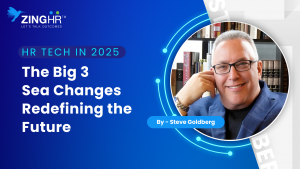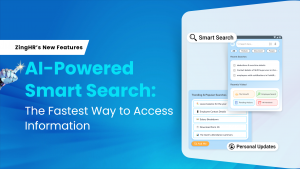ZingHR’s Shetul Thakrar, Shares His Point of View
People have perceived the role of Human Resources as a ‘department’ assigned to manage administration and maintain relations between employees and employers. It is only in recent years that leaders are making an argument for a seat at the strategy table. Why? How Does HR Directly Contribute? The potential of the HR organization to directly impact business gains is increasing.
ZingHR has been at the forefront of empowering HR teams to realize their true potential as business drivers and strategists. Shetul Thakrar, CFO of ZingHR, describes ZingHR as a rocket ship focused on business outcomes through HR technology, which the company calls “Outcomation’.
According to Shetul, “The Human Resources function has evolved tremendously over time and is fast losing its tag of being simply a support department. HR is now considered a business partner, focused on business outcomes that drive revenue and profitability.”
“ZingHR’s key expertise,” he adds, “is enabling HR teams to continue contributing to business outcomes consistently, by helping them build an agile, digital HR platform.”
The advantage of digitizing the HR function and using tech to support, also, its more transactional tasks is that this allows HR to be able to partner up with other functions and improve the company’s core competencies and competitive advantages.
Shetul outlines the following 3 ways in which HR can contribute to business outcomes in this new world:

Attracting, Engaging, and Nurturing Talent
The Hiring ecosystem is extremely fragmented. The process flow is lengthy, time-consuming, and has many moving parts. However, with the use of technology, HR teams can cut down on manual tasks significantly. Also, this means they can focus their energies where they should rightly do viz. hiring the right talent, engaging and nurturing their growth. Studies prove that an engaged workforce is more driven and motivated, resulting in lower employee turnover and greater profitability. Similarly, companies that focus on nurturing good talent gain a better, more competent workforce committed to business goals and vision. In short, it is a sure-shot route to long-term business sustainability.
Employee Experience and Empowering Teams
Improved employee experience is key to fostering collaboration. In the same vein, empowering teams with tools and means to work faster and smarter, better express themselves and achieve their individual goals goes a long way. Companies that have highly engaged employees have seen increased revenue and profits, increased business brand value, and display strong company cultures. All of these are ideal outcomes for any business.


Deploying the Power of Analytics
According to the Gartner Glossary, “HR analytics (also known as people analytics) is the collection and application of talent data to improve critical talent and business outcomes. HR analytics leaders enable HR leaders to develop data-driven insights to inform talent decisions, improve workforce processes and promote positive employee experience.” This directly answers the question of the “How” after the “Why” and “What”, when it comes to the mission / vision of any organization. If we empower the HR function with powerful analytics, we can help increase the speed of decision-making, drive strategic workforce planning, identify areas of skilling / reskilling and eliminate redundant costs.
“There are many more ways that HR is transforming from a service to a strategic function through technology transformation, but these three focus areas are sure shot winners,” says Shetul. ZingHR is proud to be at the forefront of helping to achieve this transformation for companies, by leading both in thought and action.




